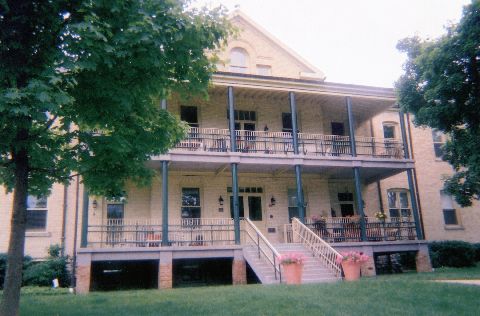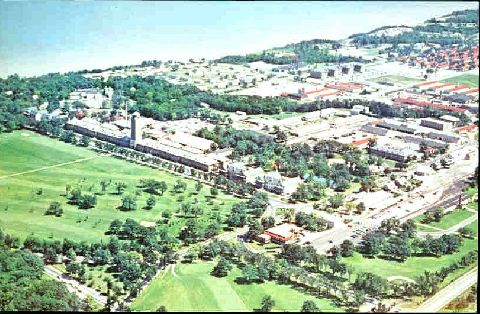Strike Up The Band
In the Spring of 1953 it seemed the Korean Police Action was going to go on forever with “Peace Talks” bogging down on who should sit on which side of the table, what shape the table should be, and where the talks should take place. It had degenerated into a “Which side can kill the most soldiers today?” kind of war – Take a hill and vacate it so we could kill more “gooks” in re-taking it the next day. Neither I nor any of my friends were eager to become a statistic in the “who won today?” game. Our choices were to be drafted and end up wherever fate sent us for two years or enlist with a reasonably good guarantee that we would end up where we wanted to be for three years. In May, 1953 I made my choice by enlisting into the “Fifth Army Band.”
The Fifth Army Band was stationed at a beautiful old horse cavalry post located right on the shores of Lake Michigan, some 40 miles north of downtown Chicago. In 1953 instead of being home to a remuda of horses and a cavalry troop it was home to. . . . (No, I must resist the temptation to write a description citing a part of a horse’s anatomy.) a gaggle of generals and bird colonels: high-level decision-makers who worked at Fifth Army Headquarters on the South Side of Chicago and all the support troops it took to maintain them and the post. The Fifth Army Band was there as a PR “showpiece” for the “Fifth Army.” It was my “home “ from mid-1953 to mid-1956.

Home of the United States Fifth Army Band 194? to 197?
The day I signed-in there were just under 100 men in the band and except for a handful of career Army men every one of them had a Bachelor’s degree; plus over forty had their Master’s degree in music. Quite honestly they, to a man, had enlisted for the same reason I had – to minimize their chance of becoming a foot soldier in Korea. It hadn’t worked out all that well for many because every month “The Army” levied some number of men from the band for whatever duty the Army needed. Before the Korean Truce that meant carrying a rifle in Korea. After the truce the levies slacked off and weren't much to worry about.
Put that many well-educated musicians in an Army uniform, have them live and work together for months on end,and it’s a good bet that you are going to have an outfit that is as close to TV’s fictional M.A.S.H. as can be created – highly professional when they need to be yet, always pushing the limits of Army discipline and decorum as they find ways to make what could be a drab life bearable.
One of our primary “gigs” (musical performances) was to play a LIVE radio broadcast every Saturday morning from WGN Chicago over the old “Mutual Radio Network.” Of all the performances I’ve heard in a long life I have never heard a band perform better than we did. With one ear-jarring exception that was done to make a point.
Our C.O. and Band Director was a Chief Warrant Officer – a career soldier. He undoubtedly had strong musical qualifications but he was hopelessly incompetent as a “leader of men.” Most of the time it really didn’t matter. He picked the music, conducted rehearsals and concerts and left the “running” of the band to the First Sergeant, who knew how to lead men. We actually lived a reasonably comfortable life with very little supervision in our barracks. We knew enough to keep the building clean and beds made properly.
There came a week, though, when our C.O. went on a rampage. It was “Basic Training” all over again. Scub floors, standby inspections, etc. We, of course, had to and did, “soldier” for him. But a slow, seething anger was building and we found the perfect way to let our C.O./Director know that it wouldn’t be in his best interests to continue his draconian behavior. The beauty of our plan was that we couldn’t be held accountable for having done anything wrong.
Prior to our Saturday morning live broadcast we would do a “dry run” performance with a professional announcer to perfect our timing. Then we’d take a half-hour break, come back and go “On The Air” live. Our broadcasts ALWAYS began with a brilliant, short and brassy fanfare such as you might hear if a King had entered. Following the brief fanfare the announcer would excitedly say, “Music, from Chicago!” Then, another brief fanfare, followed again by the announcer who said, “The United States Fifth Army Band will Pass in Review,” after which we played a final fanfare followed by a few more words from the announcer. It was a classy beginning of a great band concert – except one notable day.
On that day we played a flawless Dry Run. Then during our break most of the guys pulled their tuning slides out just enough to ensure that their horn would be out of tune. When the “On The Air” red light came on in the studio our conductor gave the downbeat to start the fanfare. The next few moments were priceless. The pity is that this was before the time of camcorders, etc, so they live only in our memories.
Our Director was a rather ruddy faced Irishman to begin with. When the sound of that first fanfare hit his ears his face turned crimson and his expression became that of a man suddenly struck with pain. We were LIVE: “On The Air.” He could say nothing. The discord continued throughout the opening fanfares and announcements. When the fanfares were over, during the moments while the announcer was doing his spiel about the joys of Army life, we covertly put our tuning slides back where they belonged. The broadcast went on with our usual professional sound going over the airwaves.
Nothing was EVER said about that incident. However, life in our barracks went back to normal. That is to say; it went back to the “live and let live” standard to which we were accustomed.
Our routine day was to crawl out of bed only early enough to get breakfast – or sleep in without breakfast if we chose. At 0900 we gathered in the rehearsal room for Roll Call and any announcements the First Sergeant had. Then our C.O./Band Director would come in to begin our morning rehearsal. After lunch we had another rehearsal for a couple of hours after which we did some minor housekeeping in the building. The only deviance from our routine was on days when we traveled somewhere for a parade or concert, or on a day when “The Brass” scheduled some ceremony on the parade ground of the post.
Although live buglers were a thing of the past the Army had provided a P.A. system that was hard-wired to most of the buildings on the post and to some huge outdoor speakers in “The Tower.” Just as in olden times our days were punctuated by bugle calls. Worst of all was reveille which came blasting into our sleeping quarters every morning though a large speaker with a flared horn. Ordinarily there was no requirement that we get out of bed at that time so every so often someone would stuff a towel into the “throat” of that speaker to silence it. It would stay until one of the sergeants noticed and pulled it out. That little drama was played out periodically during my months there.

"The Tower" at Ft. Sheridan IL
(Our barracks was just out of the picture, to the left)
One winter “The Brass” decided that ALL troops should “Fall Out” in front of their buildings for reveille. We had no choice but to drag out of bed, stumble outside into the cold dark night and “stand reveille.” After that many of us went back to bed. Of course neither our C.O. nor our First Sergeant had to be there – and weren’t. During Midwinter in that part of Illinois it is pitch dark at 0530. That being the case many of us in the band saw no need to put much clothing on beneath our overcoats. Shoes, no socks, pants with no shirt under our overcoat and our cap sufficed. It was far too dark for the “Officer of the Day” to see us from his vantage point several hundred feet away in front of "The Tower." Our luck held. No officer ever actually came down to check us out.
The Army has its mandatory jargon for ceremonies of course and part of the reveille ritual required the person in charge of us, when his turn came, to yell loudly, “Fifth Army Band all present or accounted for, Sir.” But clear enunciation was not only not required it was considered amateurish. It became a game for whichever Non-Com was in charge to see who could yell out the most unintelligible, yet “legitimate sounding” report to the Officer of the Day.
I left the Fifth Army Band in June, 1956 with a fantastically rich musical experience behind me. I had played in a band with musicians of the highest caliber and had marched in parades down Chicago’s Michigan Avenue with a band that took up the entire street and filled the “canyon” between the buildings with martial music so strong and stirring that windows rattled and little children backed up against their Mama's skirt. I had also spent 3 years with young men who were supremely witty, creative, and clever in their ability to make what could have been a drab life interesting. Justice requires me; however, to say again that whenever we were functioning as Army Bandsmen, we performed at a level of excellence few bands achieve.
Most of us are gone now. The Fifth Army Band itself ceased to exist sometime in the late 1970’s. It had quite a run. I am honored to have been a part of it.

This is an aerial view of Ft. Sheridan as it appears today. It was sold to a private developer who turned it into a very upscale, gated community on the shores of Lake Michigan. The former barracks of the Fifth Army Band are at the very end of the buildings on the left of The Tower.
About the author
Comments 3
Don, what a fantastic experience it must have been to be with the caliber of musicians you guys were! Great story. I especially had to SMILE with the brilliant communications plan you had to let your superior(s) know that in order to lead, they had to follow the plan of the 'followers.'
Musically, it was probably the high point of my life. It was an "experience-filled" 3 years. We performed for everything from the (then) annual "Corn Husking Contest" in downstate IL to President Eisenhower when he appeared at the IL State Fair.
Thank you so much for sharing this story. My father, Elwood J. Willey, served in the Fifth Army Band in 1951 and 1952. He was a French horn player and also directed a small Army chorus. He told us many stories of marching down State Street and performing on the radio. He is gone now, but he left me with a love of military history and a great respect for veterans. Thank you for your service, in tune or out.




